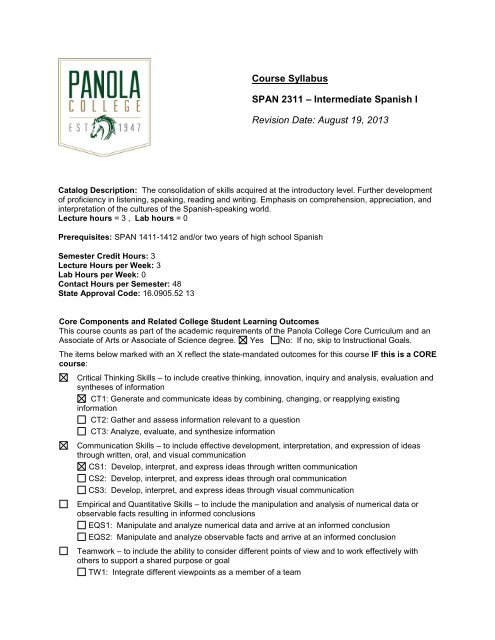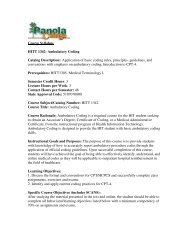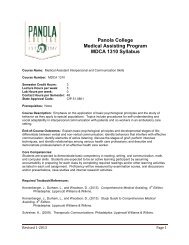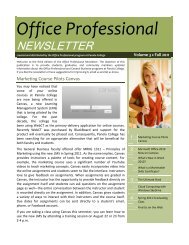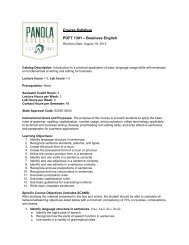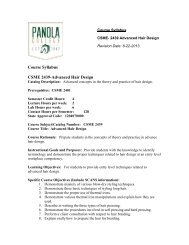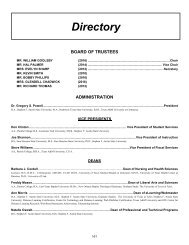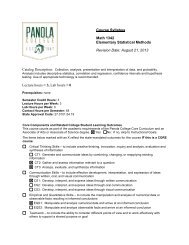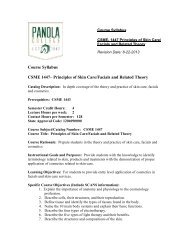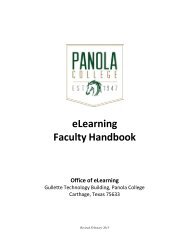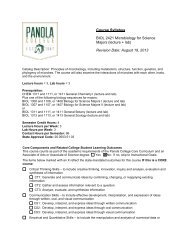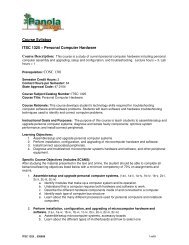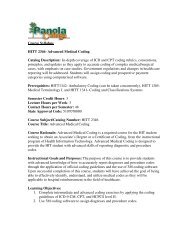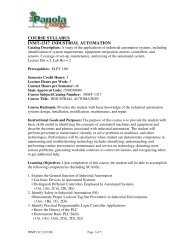Revised January, 2013 Course Syllabus SPAN 2311 â Intermediate ...
Revised January, 2013 Course Syllabus SPAN 2311 â Intermediate ...
Revised January, 2013 Course Syllabus SPAN 2311 â Intermediate ...
Create successful ePaper yourself
Turn your PDF publications into a flip-book with our unique Google optimized e-Paper software.
<strong>Course</strong> <strong>Syllabus</strong><br />
<strong>SPAN</strong> <strong>2311</strong> – <strong>Intermediate</strong> Spanish I<br />
Revision Date: August 19, <strong>2013</strong><br />
Catalog Description: The consolidation of skills acquired at the introductory level. Further development<br />
of proficiency in listening, speaking, reading and writing. Emphasis on comprehension, appreciation, and<br />
interpretation of the cultures of the Spanish-speaking world.<br />
Lecture hours = 3 , Lab hours = 0<br />
Prerequisites: <strong>SPAN</strong> 1411-1412 and/or two years of high school Spanish<br />
Semester Credit Hours: 3<br />
Lecture Hours per Week: 3<br />
Lab Hours per Week: 0<br />
Contact Hours per Semester: 48<br />
State Approval Code: 16.0905.52 13<br />
Core Components and Related College Student Learning Outcomes<br />
This course counts as part of the academic requirements of the Panola College Core Curriculum and an<br />
Associate of Arts or Associate of Science degree. Yes No: If no, skip to Instructional Goals.<br />
The items below marked with an X reflect the state-mandated outcomes for this course IF this is a CORE<br />
course:<br />
Critical Thinking Skills – to include creative thinking, innovation, inquiry and analysis, evaluation and<br />
syntheses of information<br />
CT1: Generate and communicate ideas by combining, changing, or reapplying existing<br />
information<br />
CT2: Gather and assess information relevant to a question<br />
CT3: Analyze, evaluate, and synthesize information<br />
Communication Skills – to include effective development, interpretation, and expression of ideas<br />
through written, oral, and visual communication<br />
CS1: Develop, interpret, and express ideas through written communication<br />
CS2: Develop, interpret, and express ideas through oral communication<br />
CS3: Develop, interpret, and express ideas through visual communication<br />
Empirical and Quantitative Skills – to include the manipulation and analysis of numerical data or<br />
observable facts resulting in informed conclusions<br />
EQS1: Manipulate and analyze numerical data and arrive at an informed conclusion<br />
EQS2: Manipulate and analyze observable facts and arrive at an informed conclusion<br />
Teamwork – to include the ability to consider different points of view and to work effectively with<br />
others to support a shared purpose or goal<br />
TW1: Integrate different viewpoints as a member of a team
TW2: Work with others to support and accomplish a shared goal<br />
Personal Responsibility – to include the ability to connect choices, actions, and consequences to<br />
ethical decision-making<br />
PR1: Evaluate choices and actions and relate consequences to decision-making<br />
Social Responsibility – to include intercultural competence, knowledge of civic responsibility, and the<br />
ability to engage effectively in regional, national, and global communities<br />
SR1: Demonstrate intercultural competence<br />
SR2: Identify civic responsibility<br />
SR3: Engage in regional, national, and global communities<br />
Instructional Goals and Purposes:<br />
This course will emphasize the four language skills of listening, speaking, reading and writing, as well as<br />
an appreciation of Hispanic culture. To develop these skills to the best of the student’s ability, active<br />
participation by the student is required. Increased proficiency in the Spanish language is desired.<br />
Learning Outcomes: [from the ACGM catalog]<br />
After studying all materials and resources presented in the course, the student will be able to:<br />
1. Demonstrate comprehension of authentic spoken discourse produced by Spanish speakers of diverse<br />
origins.<br />
2. Produce oral Spanish comprehensible to native speakers using complex grammatical structures to<br />
narrate, describe and elicit information.<br />
3. Demonstrate increasing comprehension of authentic written texts in a variety of genres.<br />
4. Write descriptions and narratives at a low intermediate level using complex grammatical structures.<br />
5. Formulate cohesive paragraphs and short/simple essays.<br />
6. Describe cultural practices and products of the Spanish-speaking world drawing on authentic materials<br />
including literature and the visual arts.<br />
<strong>Course</strong> Content:<br />
Students in all sections of this course will learn the following content:<br />
1. past participles, present perfect and pluperfect indicative tenses, the past participle used as an<br />
adjective<br />
2. the future tense, verbs irregular in the future, uses of the future tense<br />
3. stem-changing verbs, familiar and formal commands of regular and irregular verbs, irregular<br />
comparison of adjectives and adverbs<br />
4. the present subjunctive of regular verbs, the present subjunctive of irregular and stem-changing verbs<br />
5. theory of the subjunctive mood, the subjunctive in noun clauses<br />
6. the present subjunctive of verbs with changes in spelling, the subjunctive in noun clauses, the present<br />
perfect subjunctive<br />
7. possessive pronouns, the definite article used as a demonstrative, the passive voice, the subjunctive<br />
after tal vez, quizás, lo, forms of verbs in uir<br />
8. special use of plural reflexive pronouns, summary of uses of por and para<br />
9. adjective clauses and relative pronouns, the subjunctive in adjective clauses, hacer in time clauses<br />
10. literary works by María Elena Llana, Alfonso Ferrari Amores, Marco Denevi, Conrado Nalé Roxlo,<br />
Rubén Loza Aguerreberre and others<br />
Methods of Instruction/<strong>Course</strong> Format/Delivery:<br />
Instruction for this course will be achieved through the use of lecture, discussion, video, student<br />
presentations and Canvas.<br />
2
Assessment:<br />
Reading:<br />
1. students will answer questions in the reading comprehension section of each written test and the final<br />
exam<br />
2. students will complete internet activities over Spanish websites<br />
Listening:<br />
3. students will answer questions in the listening comprehension section of each written test responding<br />
to audio materials in various formats that use the vocabulary and grammatical structures previously<br />
covered<br />
4. students will also answer questions about their conversations<br />
Writing:<br />
5. students will write in different situations including dialogues, descriptions and narratives<br />
6. students will write using different modes of expression as part of each written test and final exam<br />
Speaking:<br />
7. students will demonstrate their mastery of vocabulary and grammar by oral quizzes and presentations<br />
8. pronunciation will be evaluated during conversations in class<br />
Cultural Awareness:<br />
9. students will respond to videos about the various Spanish-speaking countries<br />
10. students will give oral reports to the class over some aspect of Spanish (folklore, literature, fine arts,<br />
etc.)<br />
<strong>Course</strong> Grade:<br />
The grade for this course will be based on daily work and tests. Daily work could possibly include quizzes<br />
(announced and/or unannounced), workbook, in-class assignments, homework and audio assignments,<br />
journal writing, video viewing and oral participation. Tests will be frequent and given about every two<br />
chapters. The final is comprehensive. The grade breakdown is 80% exams and 20% daily work.<br />
Texts, Materials, and Supplies:<br />
Destinos (Van Patten, McGraw Hill)<br />
Destinos Workbook/Study Guide, Part 2<br />
Imaginación y Fantasía (Yates & Dalbor, Holt Rinehart Winston)<br />
Other:<br />
For current texts and materials, use the following link to access bookstore listings:<br />
http://www.panolacollegestore.com<br />
For testing services, use the following link: http://www.panola.edu/elearning/testing.html<br />
If any student in this class has special classroom or testing needs because of a physical learning<br />
or emotional condition, please contact the ADA Student Coordinator in Support Services located<br />
in the Administration Building or go to http://www.panola.edu/student-success/disability-supportservices/<br />
for more information.<br />
Withdrawing from a course is the student’s responsibility. Students who do not attend class and<br />
who do not withdraw will receive the grade earned for the course.<br />
Student Handbook, The Pathfinder: http://www.panola.edu/studentsuccess/documents/pathfinder.pdf<br />
3


